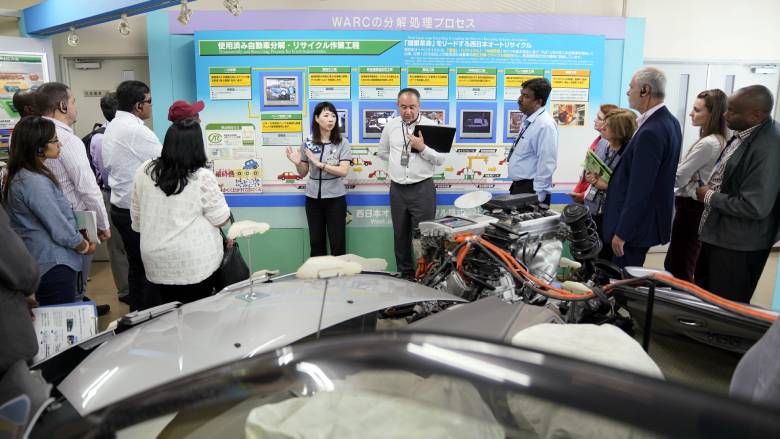By 2050, the world is expected to nearly double waste generation annually, to 3.76 billion tons from today’s 2.10 billion tons. Key challenges that make sustainable waste management a complicated proposition, especially for low- to middle-income countries with rapid urbanization, include costly and complex waste operations, unavailable or inaccurate waste data, and inefficient management by local authorities, which usually have limited resources and capacities for planning, etc. The concept of a “circular economy” is increasingly being understood and adopted to manage municipal and industrial waste.
Practitioners and technical experts on solid waste management (SWM) from 14 countries joined the TDD with a focus on SWM laws and policies, institutional structure, regulatory and financial mechanisms, citizen and private sector engagement, and SWM technologies. Participants were exposed to Japan’s SWM experience, which presented unique opportunities for collaborative learning and knowledge sharing. At the TDD, international experiences and trends in SWM, including in Singapore, the United States, and the United Kingdom, were shared to provide insights on the best practices followed in these countries. The TDD focused on the following aspects of SWM: (i) institutional setup within municipal administrations and enabling setup by central governments, including different policies, (ii) financing and cost recovery of SWM, and (iii) modalities used for citizen engagement and behavioral change in Japan. Several sites were visited in Kitakyushu City to observe the entire SWM cycle process, including the collection site, Hiagiri recycling center for waste cans and bottles, Hiagiri incineration, Hibikinada landfill, and Kitakyushu’s Eco-Town Center. Delegations learned about the systems and technologies adopted by the city to recycle and manage solid waste with the aim of reducing it to zero.
Participants were exposed to various approaches and experiences from three Japanese cities that differed in their populations, solid waste challenges, and prioritization of actions to address their challenges. Participants learned from Kyoto’s organic waste reduction strategy and efforts, Osaka’s approach to SWM in city centers and residential areas (focusing on reduction and collection), and Fukuoka’s final waste disposal treatment (known as the Fukuoka method). Overall, key lessons were on the Japanese experience in waste collection and recycling, institutional setup for solid waste management operations at the local level, financing and cost recovery, and citizen engagement.
